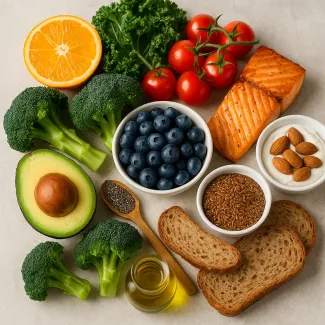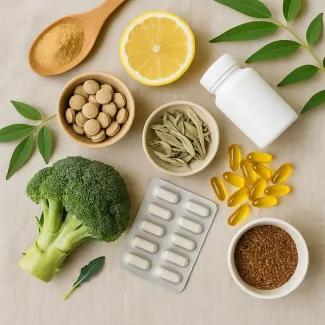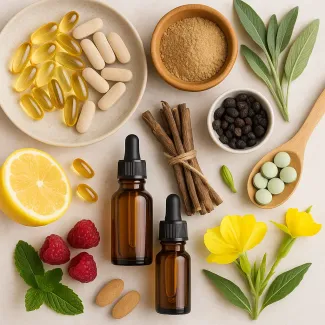
Essential Nutrition Tips for Staying Youthful in Your 30s
How to Nourish Your Body and Maintain Radiant Health After 30
The transition into your 30s marks a turning point for your metabolism, skin health, hormonal balance, and cellular function. While aging is a natural process, premature aging—characterized by fine lines, chronic fatigue, loss of elasticity, or digestive issues—can be largely influenced by lifestyle and especially dietary choices. In this article, we explore the best anti-aging foods that help you support your body’s regenerative systems, prevent oxidative damage, and maintain energy and vitality well into your 40s and beyond.
Why Your Diet Matters More After 30
The human body begins to produce less collagen, elastin, and certain hormones after the age of 30. At the same time, free radical damage from pollution, stress, and poor food choices can accumulate. As a result, nutrient-dense food becomes essential to preserve youthful appearance, mental sharpness, and joint flexibility.
What you eat can either speed up or slow down cellular aging. The right nutrients can protect against inflammation, oxidative stress, and glycation—all key factors in premature aging. Therefore, it is crucial to develop a conscious approach to nutrition that nourishes your skin, organs, and immune system.
Antioxidant-Rich Foods for Skin and Cell Protection
The Power of Polyphenols and Flavonoids
Foods high in polyphenols and flavonoids act as natural defenders against oxidative damage. These plant compounds neutralize free radicals, support healthy circulation, and protect skin cells from environmental stressors.
Best Sources:
- Blueberries, blackberries, raspberries – rich in anthocyanins
- Dark chocolate (at least 70% cocoa) – high in catechins and flavonoids
- Green tea – a powerful source of EGCG
- Red cabbage and beets – packed with betalains
Regular consumption of these foods has been linked to improved skin tone, reduced appearance of wrinkles, and better cognitive function.
Vitamin C-Loaded Fruits for Collagen Production
Vitamin C is crucial for stimulating collagen synthesis, protecting against UV-induced skin damage, and strengthening the immune system. It also aids in the absorption of iron from plant-based foods, which is essential for oxygen delivery to tissues.
Best Sources:
- Kiwis
- Citrus fruits like oranges and grapefruits
- Papaya
- Strawberries
- Bell peppers
Incorporate a variety of these fruits daily to help preserve skin firmness and support wound healing.
Healthy Fats for Hormones and Hydration
Omega-3 Fatty Acids to Reduce Inflammation
As you age, your body becomes more prone to inflammatory processes, which contribute to joint stiffness, heart disease, and skin redness. Omega-3 fatty acids play a critical role in reducing inflammation and supporting cell membrane integrity.
Best Sources:
- Fatty fish such as salmon, mackerel, sardines
- Chia seeds and flaxseeds
- Walnuts
- Algal oil (a plant-based option for vegans)
These foods help maintain skin moisture, regulate mood, and protect brain health.
Avocados and Extra Virgin Olive Oil for Skin Elasticity
Monounsaturated fats found in avocados and extra virgin olive oil enhance skin hydration, boost the absorption of fat-soluble vitamins (A, D, E, and K), and provide anti-inflammatory benefits.
Use these fats in moderation to enrich meals, improve lipid profiles, and support hormonal balance.
Crucial Proteins for Muscle Mass and Longevity
Why Lean Protein Becomes More Important
After 30, the body naturally begins to lose muscle mass, a process known as sarcopenia. To counteract this, a consistent intake of lean proteins is necessary for muscle repair, hormone production, and skin regeneration.
Top Protein Sources:
- Eggs
- Chicken breast
- Turkey
- Tofu and tempeh
- Lentils and chickpeas
- Quinoa
Combine plant and animal sources to obtain a full amino acid profile. This is especially crucial for maintaining metabolic rate, reducing fatigue, and keeping the skin firm and supple.
Crucial Micronutrients for Healthy Aging
Zinc, Selenium, and Magnesium: The Underestimated Trio
These essential minerals play a variety of roles in aging prevention—from supporting DNA repair and thyroid function to improving sleep and regulating inflammation.
Foods Rich in These Minerals:
- Pumpkin seeds (zinc)
- Brazil nuts (selenium)
- Spinach, almonds, and dark chocolate (magnesium)
Ensuring adequate levels of these micronutrients helps maintain strong immunity, healthy hair, and glowing skin.
Gut Health and Detoxification Support
Prebiotics and Probiotics for a Balanced Microbiome
Your gut health directly influences immunity, mood, digestion, and skin clarity. A healthy microbiome can enhance nutrient absorption and reduce systemic inflammation.
Best Gut-Supportive Foods:
- Yogurt with live cultures
- Kefir
- Sauerkraut and kimchi
- Asparagus, garlic, and onions (prebiotics)
Include a variety of fermented and fiber-rich foods to support a thriving gut ecosystem and improve overall well-being.
Hydration and Herbal Support for Radiant Skin
Water-Rich Foods and Herbal Teas
Proper hydration is one of the simplest yet most overlooked strategies to delay aging. Consuming water-rich fruits and herbal infusions not only improves skin texture but also supports kidney function and toxin elimination.
Top Choices:
- Cucumber
- Watermelon
- Celery
- Mint tea
- Nettle tea
These help flush excess waste, hydrate tissues, and promote a clear complexion.
Lifestyle Eating Habits That Boost Youthfulness
Eat the Rainbow: Diversity Matters
A colorful plate isn’t just aesthetically pleasing—it reflects nutritional diversity. Each pigment family contains unique compounds beneficial to various organs and systems. Eating a wide range of colors ensures that you receive complementary antioxidants, vitamins, and minerals.
Try to include:
- Orange and yellow foods for vitamin A (carrots, pumpkin)
- Green for chlorophyll and folate (broccoli, kale)
- Purple and blue for anthocyanins (grapes, eggplant)
- Red for lycopene (tomatoes, red peppers)
Practice Mindful Eating
Slowing down, chewing thoroughly, and being present with your food improves digestion, reduces overeating, and fosters a healthier relationship with nutrition. This leads to better nutrient utilization and less stress-induced aging.
Foods and Habits to Avoid After 30
Key Dietary Culprits of Premature Aging
Not all food supports longevity. Certain ingredients accelerate the aging process, weaken immunity, and contribute to inflammation.
Limit or avoid:
- Refined sugars and high-fructose corn syrup
- Trans fats and processed oils
- Excess alcohol
- Highly processed snacks and ready meals
- Charred and burnt meats
Avoiding these foods helps prevent glycation, a process that damages collagen, stiffens skin, and increases the risk of chronic disease.
Creating a Sustainable Anti-Aging Meal Plan
Weekly Structure for Balanced Nutrient Intake
Creating a meal plan that incorporates the above foods is not only realistic—it’s essential. A weekly plan should include:
- 2-3 servings of oily fish
- Daily portions of leafy greens
- Rotating berries and citrus fruits
- Legumes and whole grains
- Fermented foods every other day
- Hydrating snacks and teas
This structure supports your skin, energy, hormones, and cellular health with minimal effort.
Nourishment is the New Anti-Aging Secret
What you choose to eat daily has the power to transform your energy, appearance, and biological age. While no single food is a miracle cure, a diet rich in whole, colorful, and nutrient-dense foods—combined with proper hydration and mindful habits—can significantly delay visible signs of aging.
Start today by adding a variety of antioxidants, healthy fats, and gut-friendly foods to your meals. Your body will thank you, not just in your 30s, but for decades to come.





